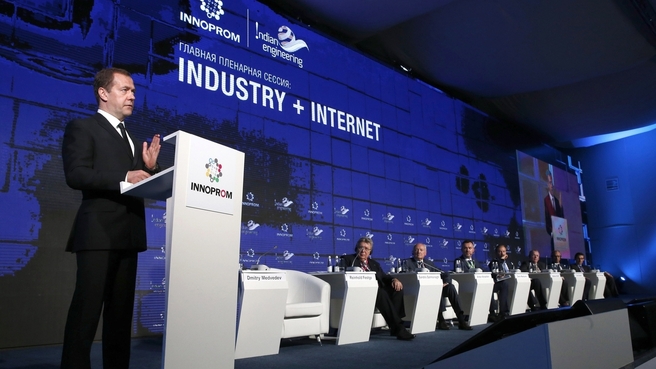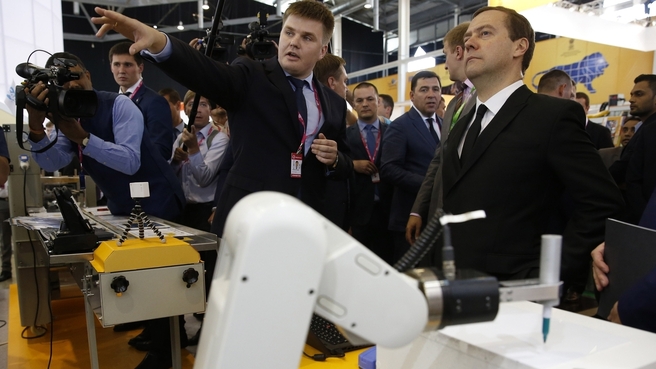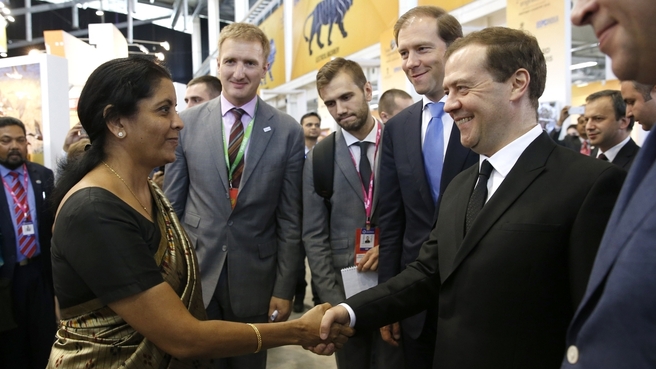Dmitry Medvedev addressed the plenary meeting.
From Dmitry Medvedev’s opening remarks:
Dmitry Medvedev’s speech at the plenary meeting of the INNOPROM-2016 International Industrial Trade Fair
The Innoprom platform has grown every year, attracting an increasing number of participants. It is developing both as a trade show and as a discussion format.
Innoprom has become firmly established in its niche of prospective industrial development.
It sometimes seems as though the forum’s agenda is developing faster than current trends. We need to know where the world is moving, how it is developing and how global markets will change in 10 or 20 years, and we must see the horizon of the technological agenda. We know what we can offer our partners in the way of future cooperation.
The so-called Internet of Things, or industrial net, actually suggests a fusion of physical and information realities, when millions or even billions of devices exchange data via modern communications channels in real time and also provide feedback. Moreover, they may sometimes take independent technological decisions without human involvement suggesting how to respond to various objectives.
The industrial net definitely has a future. This system will develop alongside other digital technologies.
Market leaders have come to appreciate the efficiency of the system, which attracts major investment.
Russia can offer many smart solutions based on the industrial net, but these solutions are as yet small islands of industrial culture in an economic sea. We have launched the National Technology Initiative (NTI) to advance a more systematic approach in this area. Nearly all the NTI roadmaps are based on the net principle.
Today it is very important to decide on both a legal foundation and on standards. It is extremely hard to do this at the national level. All interested parties should be involved in this in the global economy. There are no binding universal international rules even as regards the basic Internet. The range of opinions is very broad – from a refusal to govern anything to the proposals to standardise almost everything. Naturally, neither of these extremes is taken seriously but we have to pay attention to this.
The risks and threats to security systems, including technological ones, are increasing. It is possible to take control of the activities of various technological structures or paralyse the operation of a vital infrastructure, plants, power stations or transport remotely.
Using technology to damage a specific entity is becoming a widespread practice in the bid to weaken competitors, for industrial espionage or even in terrorist activities, which are the biggest global challenge to all nations.
Being open to communications in this sense should not mean being helpless in the face of modern threats. We must act as one to counter them. I consider this a goal for individual countries and governments within different venues, including universal organisations like the UN International Telecommunication Union.
Russia has drafted a roadmap to develop technology for the industrial net, the Internet of Things. Proposals on the normative foundation that are required for its introduction are due to be formulated by November.
If need be, we’ll prepare these rules quickly and will publish and use them. What is much more important is the demand for such technology on behalf of industrial companies. To achieve this, it is necessary to channel industrial investment into upgrading production lines, equipment and depots. One of the key areas is the formation of a consortium by key actors including industrial companies, developers, providers of service solutions and, of course, research and educational institutions. This consortium should consolidate the entire industry, offer proposals on standardisation and standard regulations, promote this technology and attract financial partners.
I’m confident that Innoprom will help us consolidate different approaches and eventually facilitate the development of both national and international decision-making on this issue.












